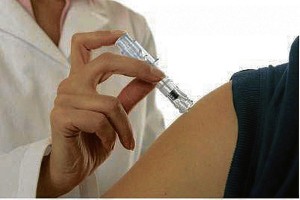New device help elderly overcome flu and needle fear

WITH SHORTER, thinner and not readily visible needle, the Intanza device is more convenient for the elderly and less scary for those with aversion to injections.
Trypanophobia, otherwise known as needle phobia, is the extreme fear of medical procedures involving injections or hypodermic needles. It can range from a mild dread to a moderate case of the jitters to a full-blown phobia in which the individual already avoids medical care entirely.
It’s what keeps Ireneo Lasan, 68, from getting vaccinated despite the urging of his family. “I just don’t feel comfortable at the sight of a needle and syringe. But I regularly exercise, eat nutritious foods and take my medications to keep me healthy, free of diseases and away from the needle,” the retired government employee said.
But his efforts may not be enough as some diseases, like influenza, could still occur even in healthy individuals.
Flu viruses
“Influenza, for example, is caused by a virus infecting the body. Flu viruses travel through the air in droplets when someone with the infection coughs, sneezes or talks. One can inhale the droplets directly, or that the germs can be picked up from an object such as a telephone or computer keyboard and then transfer them to the unknowing victim’s eyes, nose or mouth,” explained Dr. Patrick Magalit, Philippine College of Chest Physicians’ Council on Lung Infections chair.
Article continues after this advertisementHe added that the influenza remains a threat and that its annual occurrences are associated with high morbidity and mortality. A World Health organization data estimates that its annual epidemic results in about three to five million cases of severe illness, and about 250,000 to 500,000 deaths.
Article continues after this advertisementDevelop complications
The doctor explained that while the young and healthy may feel miserable for a week and afterward make a full recovery, with no lasting effect, high-risk individuals including the elderly aged 60 years old and above may develop severe complications such as pneumonia, bronchitis, sinus infections and ear infections.
“Pneumonia is the most common and most serious. For the elderly and those with chronic illness, pneumonia can be deadly. The best protection is vaccination against both pneumococcal pneumonia and influenza,” Magalit warned.
To improve compliance and help those individuals with mild form of trypanophobia, a new device was recently developed.
Intanza is the first trivalent seasonal influenza vaccine that could be administered intradermally (just under the skin) via micro-injection device. While most vaccines are injected into the muscle (intramuscular), Intanza’s microneedle allows the vaccine to be accurately delivered within the dermal layer of the skin.
This layer of the skin contains a dense network of lymphatic vessels feeding local lymph nodes, resulting in rapid and efficient access of the vaccine into the immune system. It also contains a high concentration of potent immune cells that play a key role to initiate the immune response following vaccination.
Shorter, thinner
Since the Intanza device uses a needle that is shorter, thinner, not readily visible, (it has thinner needle gauge as well as 10 to 16 times shorter than the 16mm or 25mm needles that intramuscular vaccines use) even those who shun injections may be coaxed to take the required annual shot.
Intanza employs an integrated needle-shielding system that is manually activated immediately after injection thus, minimizing the risk of needle-stick injury, contamination as well as illicit reuse.
The 15mcg preparation of the Intanza vaccine is already available in the Philippines and is indicated for elderly persons 60 years old and above.
Immune response
The 15mcg vaccine against influenza has been proven to elicit an immune response that is superior to that induced by an IM seasonal vaccine. This is due to the device that allows for a precise administration of the right amount of antigen in a very small volume of vaccine of only 0.1ml (which is five times less than that required for the regular IM route).
Such high immune response observed with Intanza make the device all the more appropriate for the elderly whose immune system is generally less resistant to infections as well as complications of influenza.
But influenza vaccination compliance has slowly improved in recent years, Magalit urged to continue public education about misconceptions or lack of knowledge about influenza infection.
“Public education about influenza is essential if strategies to reduce the impact of the disease are to be effective,” Magalit urged.